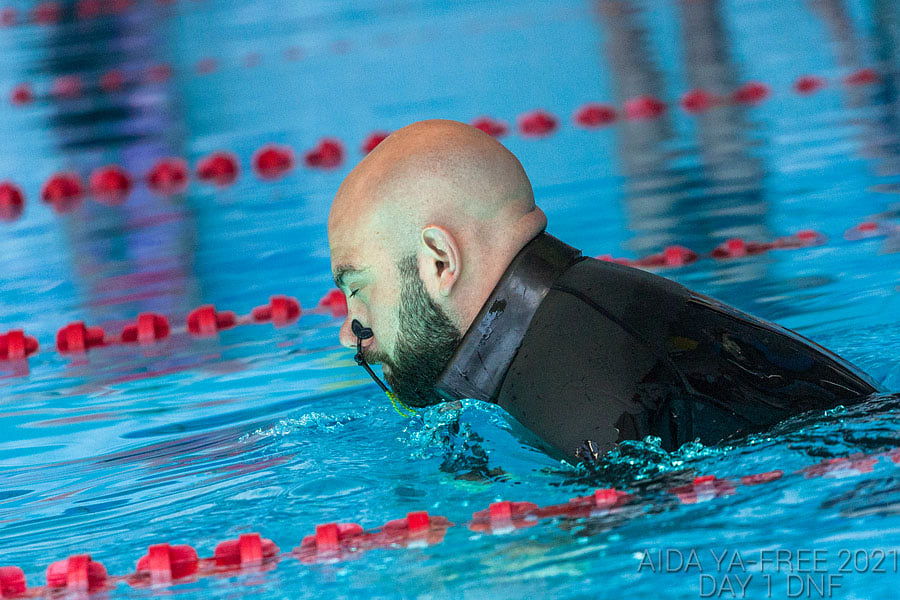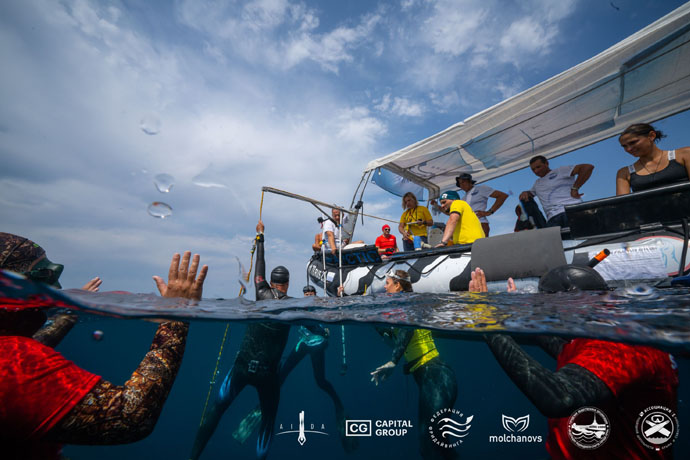Revolutionize your freediving performance with the right facial equipment and methods!
Since I still haven't finished experimenting with choosing the configuration of the equipment that I use on my face, it makes sense to review all possible options and highlight the pros and cons. I swam quite a lot in all configurations, so I will tell you my opinion on the pros and cons of each, and also add some techniques I know that may be useful when using certain equipment. A rather important concept in my review will be that there are a lot of receptors on the face and head and they feel water much stronger than the rest of the body. For me, the more area of my face and head is in contact with water, the easier it is for me to relax and "dissolve" in it. Therefore, I dive strictly in suits without a hood and without a hat. Also, the more open areas you have, the more you will feel the oncoming water flow, and the more the subjective sense of your speed will be.

Written by: Vlad MasterskikhAIDA instructor, EU pool champion
This seemingly unimportant element affects the ability to concentrate and deconcentrate, relax and follow a simple protocol, which leads to already quite tangible consequences in meters.
1. Mask
The most basic option, many most likely started this way. The mask covers most of your face, leaving only your mouth open. As a result, there is a certain feeling that you are sailing in a "submarine" and not completely immersed in water. From the point of view of relaxation, the worst option, but one of two options, is when the athlete can see underwater. This is the most archaic method; only a few strongest athletes use it now.
Pros
clear vision underwater (it is also a con, I will explain later)
in the protocol, you only need to remove one element
Cons
no contact with water, worst relaxation of all options
absolutely not fashionable
2. Goggles + clip
Here one of the options is already actively used by strong athletes. Since the glasses only cover your eyes, you will notice that the water has become much more flowing around your face. The sensation of speed will increase, as will the ability to relax. It is suitable for those who have decided that they need to see things underwater as though they are on land. The worst way in terms of protocol. You need to remove two items, i.e., perform more actions. Some athletes use an extra cord to tie the goggles and the clip so that when the clip is ripped off on the protocol, the goggles are also removed automatically. The technique is not the best, since it is planned that the glasses will be pulled around your neck, but this may not work, and they will get stuck somewhere on your face while you deal with them, either 15 seconds will pass, or you will not be able to resist, or you will try to say I'm OK with glasses in my mouth. I would not recommend this method and practice using them separately.
Pros
clear vision
better, in comparison with the mask, water flow and the ability to relax
Cons
the most inconvenient protocol of all methods
3. Clamp without glasses
A progressive and modern way, most athletes dive in this way. There are a lot of pros here. The athletes quickly realized that in the pool, as well as at the depth, there is nothing to look at. You can see the markings well enough, so it's easy to swim along the line and see the T-shaped turn mark. I once performed in Bryansk late in the evening. It was dark outside, the pool had a depth difference of 5-6 meters, and the water was still rather muddy, and the lighting was poor. Since I always trained without glasses, even in such conditions, I kept directional stability quite easily, diving there for the first time in my life. In general, if we talk about my experience, then I came to this by chance. There were problems with blowing at depth, and I decided to try to dive in the clamp. Still, since all my life from an early age, I swam only in glasses, I had some reflex that I could not suppress when my eyes came into contact with water, I started the swallowing movement and took a lot of air into the stomach. I decided to train it in the pool. In a month, it became completely comfortable, and I also noticed that the sensations during the dive changed dramatically. When the eyes are in the water, it is even easier to relax. The feeling of speed is even higher. The most pleasant bonus is that you get visual deconcentration without any effort because, without glasses, everything will be blurry. So your eyes will not cling to tiles, dirt, or a freediver sailing along the next lane. I highly recommend this method. If you dive one of the first two, tried it, and did not like it, you need to learn how to dive until it becomes comfortable for you and try to make a long dive. And only then will the final decision be made. But the inability to see clearly carries a hidden danger in the final stage of the dive, when it is useful to concentrate as much as possible to maintain control. This can be done visually with glasses, but here you have to direct everything inside the sensations. Losing control and consciousness without glasses is easier.
full unity with water, a more pronounced effect than in the clamp
very simple protocol
Cons
permanently closed soft palate
there may be unpleasant sensations from the contact of the soft palate with water
Open-eyed diving in most pools can cause eye irritation and redness. However, if this is how you perform competitive diving, then at least one dive each workout should be done this way. If you do not practice for a long time, diving without glasses can become uncomfortable again. The rest of your eye protection workout can be done with glasses. And the most important. Never use a new configuration in a competition. If you always train long dives without glasses, never decide to swim in them at competitions (for fear of not seeing the markings, for example), the likelihood that you will forget to take them off is high, plus the sensations will be unusual, respiratory discomfort is experienced differently. As always, the golden rule is that we set all experiments in training.
CO2 workout for advanced freediver athletes
Methodology for training dynamic disciplines




